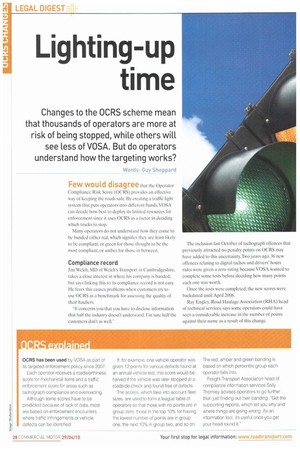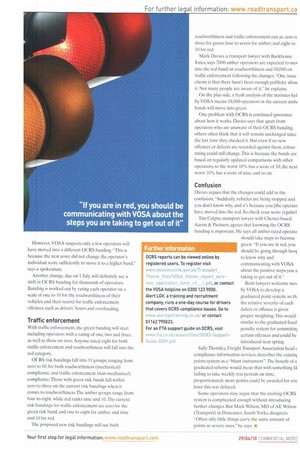1 Lighting-up . . time
Page 28

Page 29

If you've noticed an error in this article please click here to report it so we can fix it.
LEGAL DIGEST
Changes to the OCRS scheme mean that thousands of operators are more at risk of being stopped, while others will see less of VOSA. But do operators understand how the targeting works?
Words: Guy Sheppard Few would disagree that the Operator
Compliance Risk Score (OCRS) provides an effective way of keeping the roads safe. By creating a traffic light system that puts operators into different hands. VOSA can decide how best to deploy its limited resources for enforcement since it uses OCRS as a factor in deciding which trucks to stop.
Many operators do not understand how they come to be banded either red, which signifies they are least likely to be compliant, or green for those thought to be the most compliant, or amber for those in between.
Compliance record
Jim Welch. MD of Welch's Transport in Cambridgeshire, takes a close interest in where his company is banded, but says linking this to its compliance record is not easy. He fears this causes problems when customers try to use OCRS as a benchmark for assessing the quality of their hauliers.
"It concerns you that you have to disclose information that half the industry doesn't understand. I'm sure half the customers don't as well." The inclusion last October of tachograph offences that previously attracted no penalty points on OCRS may have added to this uncertainty. Two years ago, 36 new offences relating to digital tachos and drivers' hours rules were given a zero rating because VOSA wanted to complete some tests before deciding how many points each one was worth, Once the tests were completed, the new scores were backdated until April 2008, Ray Englcy, Road Haulage Association (RHA) head of technical services, says some operators could have seen a considerable increase in the number of points against their name as a result of this change. However, VOSA suspects only a few operators will have moved into a different OCRS banding. "This is because the new score did not change the operator's individual score sufficiently to move it to a higher band," says a spokesman.
Another change. due on 1 July, will definitely see a shift in OCRS banding for thousands of operators. Banding is worked out by rating each operator on a scale of one to 10 for the roadworthiness of their vehicles and their record for traffic enforcement offences. such as drivers' hours and overloading.




























































































































